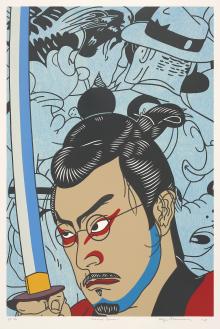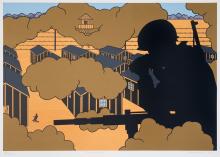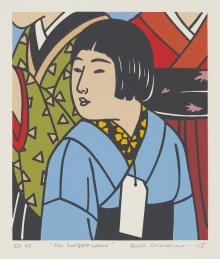Back
Roger Shimomura: By Looking Back, We Look Forward
Roger SHIMOMURA (Japanese-American, born 1939). Kansas Samurai, 2004. Screenprint; ink and color on paper, edition of 46. 45 x 31 in. Loan from the Collection of Jordan D. Schnitzer, L2019:99.11
Roger SHIMOMURA (Japanese-American, born 1939). American Guardian, 2007. Lithograph; ink and color on paper, edition XIII/XIIII. 31 ½ x 41 in. Collection of Jordan D. Schnitzer, L2019:99.3
Roger SHIMOMURA (Japanese-American, born 1939). Mistaken Identities: For Dorothea Lange, 2005. Lithograph; ink and color on paper. 14 ½ x 12 in. Collection of Jordan D. Schnitzer, L2019:99.17
Roger Shimomura: By Looking Back, We Look Forward
February 08, 2020 to June 15, 2020
Over his long and prolific career, distinguished American artist and educator Roger Shimomura has channeled his outrage and despair into beautiful, provocative, often irreverent, and sometimes inflammatory art. He uses a brightly colored Pop-Art style to depict a dizzying combination of traditional Japanese imagery and exaggerated cultural stereotypes. With an ironic touch and acerbic wit, he creates powerful works that interrogate American and Asian pop-cultural icons, notions of race, self-portraiture, and current political affairs, and interprets them through the prism of his family’s World War II internment experience.
Shimomura was born in Seattle in 1939. In 1942, he and his family were forcibly relocated to the Minidoka War Relocation Center in Hunt, Idaho—one of ten US internment camps in which 120,000 Japanese and American citizens of Japanese descent were incarcerated from 1942-45. After the war, his family returned to Seattle, where Shimomura grew up, studied art at the University of Washington, and joined the ROTC. After a short stint in the Army, he began work as a commercial designer, but returned to UW to study art. He transferred to Syracuse University, where he received an MFA in painting in 1969, merging his creative talents with his long-standing interest in pop culture and experimenting with performance and film. He then taught for 35 years at the University of Kansas, retiring in 2004.
When Shimomura was a student, Pop Art was in full swing in New York. He noticed that the movement was generally understood to be cool and detached, but he longed to make it hot and relevant. To that end, he began to juxtapose sets of images with strong ethnic connotations such as kabuki actors, samurai, and geisha with WWII imagery and icons of American popular culture in a bold Pop Art style. One hallmark of Shimomura’s work is his use of dark humor to lampoon hypocrisy and promote social justice. Many of his paintings and prints explore the experience of “forever foreigners”—visual minorities perceived as outsiders—and the terrible toll such judgments can take during times of political strife.
This exhibition is drawn primarily from the Collection of Jordan D. Schnitzer and augmented with loans from Roger Shimomura, Sherry Leedy Contemporary Art in Kansas City, the Greg Kucera Gallery in Seattle, Matt David, and works from the museum’s collection. It was curated by Anne Rose Kitagawa, Chief Curator of Collections and Asian Art and Director of Academic Programs.
Related Content:
Video: A Minute Exhibit
Slideshow: Virtual Exhibition
Gallery Guide
Video: Tour with Anne Rose Kitagawa
Video: Discussion about the exhibition with Tara Fickle and Anne Rose Kitagawa
City Club of Eugene Video: The Lasting Impact of the Internment of Japanese Americans








